Introduction
Ashwagandha, an ancient medicinal herb, is renowned for its powerful adaptogenic properties. Used for centuries in Ayurvedic medicine, this super herb helps combat stress, boost energy levels, improve brain function, and support overall well-being.
In this comprehensive guide, we will explore the numerous benefits of Ashwagandha, its scientific backing, potential side effects, and how you can incorporate it into your daily routine for optimal health.
A Brief History of Ashwagandha
Ashwagandha (Withania somnifera), also known as Indian Ginseng or Winter Cherry, has been a staple in Ayurvedic healing for over 3,000 years. Traditionally, it has been used to strengthen the body, enhance longevity, and improve mental clarity. Today, modern science continues to validate the incredible health benefits of this ancient herb.
Nutritional Profile of Ashwagandha
Ashwagandha is packed with bioactive compounds, including:
- Withanolides – Anti-inflammatory and immune-boosting compounds.
- Alkaloids – Help in stress management and relaxation.
- Saponins – Support heart health and cellular protection.
- Iron – Essential for red blood cell production and oxygen transport.
1. Reduces Stress and Anxiety
Ashwagandha is best known for its ability to lower cortisol levels, the primary stress hormone. Studies have shown that regular consumption helps reduce anxiety and stress, promoting a sense of calm and relaxation.
How to Use: Take Ashwagandha powder or capsules in the morning or before bedtime to help manage daily stress levels.
2. Enhances Energy and Stamina
By reducing stress and improving overall vitality, Ashwagandha naturally boosts energy levels and combats fatigue.
Scientific Backing: Research has demonstrated that Ashwagandha enhances physical endurance, making it a popular supplement among athletes and fitness enthusiasts.
3. Supports Brain Function and Memory
Ashwagandha has neuroprotective properties that improve cognitive function, memory retention, and focus. It helps combat brain fog and enhances mental clarity.
Best Practice: Pair Ashwagandha with ghee or milk for better absorption and cognitive benefits.
4. Strengthens Immunity
Rich in antioxidants and immune-boosting compounds, Ashwagandha helps fight infections, reduces inflammation, and supports overall immune health.
Tip: Combine Ashwagandha with honey or turmeric for enhanced immunity.
5. Improves Sleep Quality
Ashwagandha promotes restful sleep by calming the nervous system and reducing cortisol levels. It is an excellent natural remedy for insomnia and disturbed sleep patterns.
How to Consume: Mix Ashwagandha powder with warm milk before bedtime for a natural sleep aid.
6. Regulates Blood Sugar Levels
Ashwagandha has been shown to support healthy blood sugar levels and improve insulin sensitivity, making it beneficial for individuals with diabetes or those at risk of metabolic disorders.
Tip: Combine Ashwagandha with cinnamon or fenugreek for added blood sugar support.
7. Enhances Muscle Strength and Recovery
Studies indicate that Ashwagandha helps increase muscle mass, reduce body fat, and enhance muscle recovery post-exercise.
Best Practice: Consume Ashwagandha with protein shakes or after workouts for improved muscle recovery.
8. Supports Heart Health
Ashwagandha helps regulate blood pressure, reduce cholesterol levels, and protect against oxidative stress, all of which contribute to improved cardiovascular health.
Heart Health Tip: Combine Ashwagandha with a heart-friendly diet rich in omega-3s and fiber.
9. Balances Hormones and Enhances Reproductive Health
Ashwagandha is known to support hormone balance, especially in men and women dealing with stress-induced hormonal imbalances, infertility, or low libido.
For Women: Helps regulate menstrual cycles and reduce symptoms of PCOS.
For Men: Enhances testosterone levels and improves sperm quality.
10. Aids in Weight Management
Ashwagandha helps regulate metabolism, reduce stress-related eating, and support fat loss while preserving lean muscle mass.
Weight Loss Tip: Incorporate Ashwagandha into a balanced diet with regular exercise for optimal weight management.
Scientific Studies on Ashwagandha
- A study published in Phytomedicine found that Ashwagandha significantly reduces cortisol levels, aiding stress management.
- Research in The Journal of the International Society of Sports Nutrition showed that Ashwagandha enhances muscle strength and recovery.
- A clinical trial in The Indian Journal of Psychological Medicine demonstrated Ashwagandha\’s effectiveness in reducing anxiety and improving overall well-being.
How to Use Ashwagandha for Maximum Benefits
- In Smoothies: Blend with banana, almonds, and milk for an energizing drink.
- As a Tea: Mix Ashwagandha powder with warm water, honey, and ginger.
- In Capsules or Tablets: Take daily as a supplement for stress relief and energy.
- With Milk: Traditional Ayurvedic method for better absorption and calming effects.
Precautions and Side Effects
- Avoid excessive consumption, as it may cause digestive discomfort.
- Pregnant and breastfeeding women should consult a doctor before use.
- Individuals on medication should check for possible interactions.
Conclusion
Ashwagandha is a powerful adaptogenic herb that supports stress relief, energy, immunity, brain health, and overall well-being. Whether you want to improve sleep, build muscle, or enhance cognitive function, this super herb is a natural way to optimize your health.
Start incorporating Ashwagandha into your daily routine and experience its transformative benefits!


